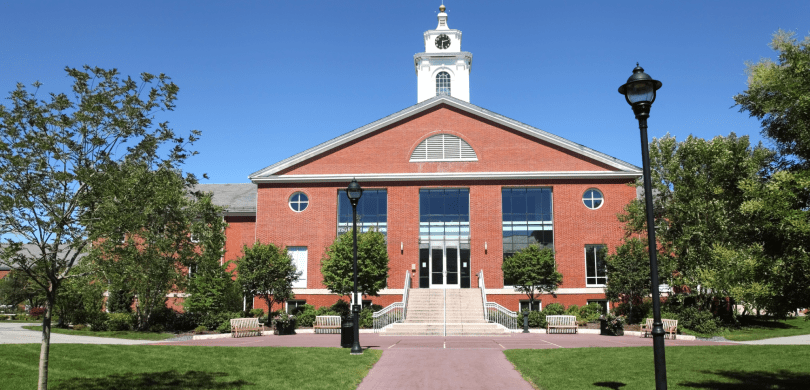Bentley University


Highlights
Outdated content management tools prevented Bentley University from being able to inform students, faculty, and prospective applicants in an engaging manner online.
The website was built using a combination of ColdFusion pages and a proprietary CMS, which created content authoring bottlenecks and made it difficult to refresh outdated content.
Drupal CMS, Acquia Cloud
- 70,000 pages across the university’s site were migrated to Drupal.
- A small web team can now facilitate content updates from more than 150 editors across campus.
- Savings are estimated at 75%, in comparison to previous investments in content management systems.
The Client
Bentley University is one of the nation’s leading business schools, and is dedicated to helping students become business leaders that will make a difference in the ever-changing world. Located on an idyllic New England campus outside of Boston, Bentley consistently ranks as one of the top universities in the Northeast.
The Situation
Serving more than 5,000 students annually, Bentley University depends on its online resources to manage over 75,000 pages of unique content, and to communicate with students, faculty, and many key stakeholders. However, outdated content management tools prevented Bentley from being able to inform various audiences in an engaging manner; content updates were difficult to manage and expanding web functionality was prohibitively expensive.
Bentley knew it needed a cost-effective and flexible solution to deliver the experience students, faculty, and prospective applicants now expect. So Bentley’s web team turned to Acquia to rebuild its flagship site with Drupal and Acquia Cloud.
The Challenge
Built using a combination of ColdFusion pages and a property CMS, the Bentley University website was a challenging property for its web team to manage. Website content was required to be updated manually, which created content authoring bottlenecks and made it difficult to refresh outdated content. Locating and retaining talent from a shrinking pool of developers for the ColdFusion platform was another challenge that had become increasingly difficult and costly. Additionally, it was cumbersome to add new functionality to ColdFusion pages.
“There were many features we were interested in adding to our site,” said Nicholas Maloney, Bentley’s web architect at the time of the initial transition. “Unfortunately, most of these solutions involved writing extensive amounts of code from scratch. This limited our growth to only the most pressing issues - which were usually reactive bug fixes and other time-sensitive issues.”
Finally, a lean web team meant that the responsibility for content updates would need to be shared across the university. “Our web team is relatively small; in fact, we have a single person who supports daily web requests, handling most inquiries and bringing in developer help if needed. Routing daily content updates through our team was simply not an option,” explained Skadi Gidionsen, Bentley’s manager of digital engagement. Bentley needed to implement a solution that would allow users across campus to add pages and content without jeopardizing the brand or site functionality.
The Solution
The Bentley University team reviewed a range of open source solution, including WordPress and Joomla, before eventually chose Drupal:
“Our selection of Drupal was based on several factors,” said Maloney. “The core Drupal technology was solid and mature. There are thousands of modules, far beyond the number any other system could offer. If we wanted a feature, there was a module that could do it. The Drupal.org community was thriving, providing not only modules, but also feedback and community support in its forums. The availability of commercial support, through Acquia, provided a level of reliability required by our leadership team. Finally, we looked at what other schools were using, and Drupal was already being validated by many other successful university sites.”
Migrating Bentley’s site over to a new platform was easier said than done. With over 70,000 pages across the university’s sites, any migration would require a Herculean effort with careful planning and disciplined efforts. Bentley engaged Acquia’s Professional Services to guide the migration and the overall architecture of the new site. With Acquia’s input, Bentley planned to migrate content according to department. This approach helped segment the project into digestible parts, and provided Bentley with a repeatable process, from which they could learn, refine, and apply to subsequent sub-domain migrations.
Bentley also engaged Palantir.net, a Drupal design firm, which provided important guidance on managing theming and customization across Bentley’s sites. This approach enabled the team to keep department websites distinct, while adhering to Bentley’s brand as centralized controls would allow modules, features, and functionality to be administered globally.
The Results
With Acquia, Bentley University’s web team has now migrated its entire site over to Drupal to offer a grade A site to a variety of audiences.
- 70,000 pages across the university’s site were migrated to Drupal.
- A small web team can now facilitate content updates from more than 150 editors across campus.
- Savings are estimated at 75%, in comparison to previous investments in Content Management Systems.
“Our web specialist trains users on how to use Drupal, then off they go. Drupal gives us the freedom to focus on the bigger picture—monitoring the overall brand and launching marketing initiatives—while ensuring a high quality site and user experience,” said Gidionsen.
Because of Bentley’s move to Drupal, the web team estimates that resources cost approximately one quarter of the corresponding ColdFusion investments. Maloney noted that site traffic and time spent on site have increased for every subdomain that has been migrated. Traffic improvements are partially due to improved accessibility through better searching, content semantics, and profiling. The university site also benefits from more new, relevant content. Because content contributors can easily add and update content, they tend to do so more frequently—increasing the site’s value to visitors.
Bentley is currently in the process of preparing for an upgrade to Drupal 8,and Gidionsen says they’re especially looking forward to taking advantage of the platform’s responsive functionality.
“Thirty percent of our site visitors are on a smartphone or tablet device, and we anticipate this will continue to grow,” Gidionsen noted. “Drupal 8’s built-in responsive themes will help us simplify our content process even further while ensuring a consistently positive experience for users regardless of their device."